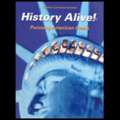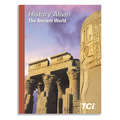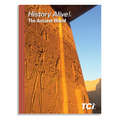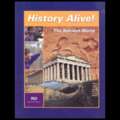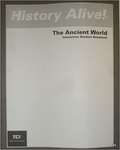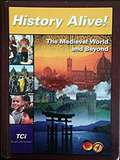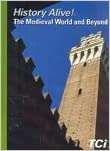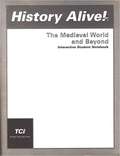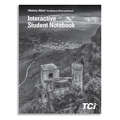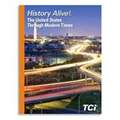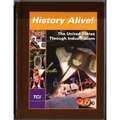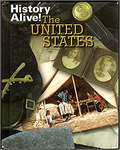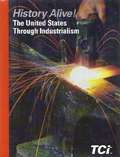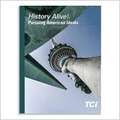- Table View
- List View
History Alive! Pursuing American Ideals
by Teachers' Curriculum InstituteHistory Alive! Pursuing American Ideals centers on the five founding ideals from the Declaration of Independence: equality, rights, liberty, opportunity, and democracy. Each generation has struggled with these ideals. Some have made little progress toward achieving them. Others have made great progress. This book invites students to become engaged in this struggle, from establishing an American republic to the making of modern America. --Website.
History Alive! Pursuing American Ideals, Student Edition
by Teachers' Curriculum InstituteNIMAC-sourced textbook
History Alive! The Ancient World
by Teachers Curriculum Institute"This program comprises six units with text on Early Humans and the Rise of Civilization, Ancient Egypt and the Middle East, Ancient India, Ancient China, Ancient Greece, and Ancient Rome. Maps, Timeline, Resources, Diagrams and Tables are additional features. "
History Alive! The Ancient World
by Teachers' Curriculum InstituteHistory Alive! The Ancient World was developed by middle school teachers at Teachers' Curriculum Institute (TCI). We, Bert Bower and Jim Lobdell, are two former high school teachers who started TCI. Our goal is to help students like you succeed in learning about history in a way that is fun and exciting. With the help of teachers from around the nation, we've created the TCI Approach to learning. This chapter explains how the TCI Approach will make ancient world history come alive for you.
History Alive! The Ancient World
by Teachers' Curriculum InstituteHistory book that covers the following units in regards to the ancient world; Early Humans and the Rise of Civilization, Ancient Egypt and the Middle East, Ancient India, Ancient Greece, Ancient Rome.
History Alive! The Ancient World, Lesson Masters
by Teachers' Curriculum InstituteNIMAC-sourced textbook
History Alive! The Ancient World: Interactive Student Notebook
by Teachers' Curriculum InstituteInteractive student notebook - companion to History Alive! The Ancient World. <P><P>History Alive! The Ancient World introduces students to the beginnings of the human story. As they explore the great early civilizations of Egypt and the Near East, India, China, Greece, and Rome, students discover the secrets of these ancient cultures that continue to influence the modern world.
History Alive! The Medieval World and Beyond
by Bert Bower Jim LobdellHistory Alive! The Medieval World and Beyond is probably unlike any other history program you have ever encountered. Perhaps you have been in history classes where you listen to the teacher and then read a textbook and answer chapter questions. Does this approach make you excited about learning history? Most students would say no, and educational researchers would tend to agree. Researchers have discovered new ways of reaching all students in the diverse classroom. This program relies on three of their theories: 1) Students learn best through multiple intelligences; 2) Cooperative interaction increases learning gains; and, 3) All students can learn via the spiral curriculum.
History Alive! The Medieval World and Beyond
by Sally Isaacs Lauren Kent Beth LasserNIMAC-sourced textbook
History Alive! The Medieval World and Beyond
by Teachers' Curriculum InstituteHistory Alive The Medieval World and Beyond , students edition introducing and expounding Europe During Medieval Times, Islam in Medieval Times, The Culture and Kingdoms of West Africa, Imperial China, Japan During Medieval Times, Civilizations of the Americas, Europe's Renaissance and Reformation, and Europe Enters the Modern Age
History Alive! The Medieval World and Beyond (History Alive!)
by Teachers' Curriculum InstituteHistory Alive! The Medieval World and Beyond (Interactive Student Notebook)
History Alive! The Medieval World and Beyond, Interactive Student Notebook
by Wendey FreyNIMAC-sourced textbook
History Alive! The Medieval World and Beyond: Interactive Student Notebook
by Teachers' Curriculum InstituteInteractive student notebook - companion to History Alive! The Medieval World and Beyond.
History Alive! The U.S. Through Modern Times Student Edition
by Frey Diane Wendy HartHistory Alive! The U.S. Through Modern Times Student Edition
History Alive! The United States Through Industrialism
by Diane Hart Bert Bower Jim LobdellHistory Alive! The United States Through Industrialism is probably unlike any other history program you have ever encountered. Perhaps you have been in history classes where you listen to the teacher and then read a textbook and answer chapter questions. Does this approach make you excited about learning history? Most students would say no, and educational researchers would tend to agree. Researchers have discovered new ways of reaching all students in the diverse classroom. This program relies on three of their theories.
History Alive! The United States Through Industrialism
by Bert Bower Jim LobdellHistory Alive! The United States through Industrialism was developed by middle school teachers at Teachers' Curriculum Institute (TCI).
History Alive! The United States Through Industrialism
by Diane Hart Bert Bower Jim LobdellA valuable resource full of imaginative, ready-to-use ideas for social studies teachers who want to involve students of all ability levels in the learning process. History is presented from a multicultural perspective to maximize student awareness.
History Alive! The United States Through Industrialism
by Sally Isaacs Lauren Kent Beth LasserNIMAC-sourced textbook
History Alive! The United States Through Industrialism
by Teachers' Curriculum InstituteHistory Alive! has literacy instruction built into the Student Text, Interactive Science Notebook, and Lesson Presentations. The following six key points emphasizes integration of literacy and language arts practices. They are particularly important in social studies instruction.
History Alive! The United States Through Industrialism, Interactive Student Notebook
by Teachers' Curriculum InstituteNIMAC-sourced textbook
History Alive! The United States Through Industrialism, Lesson Masters
by Teachers' Curriculum InstituteNIMAC-sourced textbook
History Alive! The World Through 1750
by Teachers' Curriculum InstituteExplore the world through 1750 with History Alive! The World Through 1750 HC
